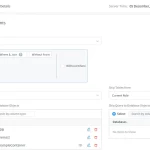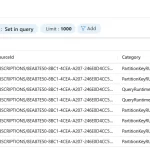
MariaDB has become a preferred open-source relational database for businesses that need flexibility, scalability, and cost efficiency. Yet, with its widespread adoption comes the challenge of ensuring proper data governance. Data governance is not just about managing access but also about maintaining transparency, accountability, and compliance in line with global regulations.
Without a strong governance framework, organizations risk data leaks, compliance violations, and unauthorized access. Regulatory fines under GDPR, HIPAA, or PCI DSS can reach millions of dollars, making governance a critical business priority.
This article explains how to apply data governance in MariaDB using native database capabilities and how to enhance those efforts with DataSunrise. For broader regulatory insights, see the Regulatory Compliance Knowledge Center.
What is Data Governance?
Data governance in MariaDB is the framework of policies, processes, and technical controls that define how data is created, accessed, protected, and monitored throughout its lifecycle. It ensures that data is treated as a critical asset, with clear ownership and accountability structures.
Effective governance includes:
- Access Control: Defining user roles and permissions to enforce the principle of least privilege.
- Data Quality and Consistency: Making sure information remains accurate and reliable across different systems.
- Auditability: Maintaining a historical record of changes and queries for compliance checks.
- Security and Privacy: Applying encryption, masking, and monitoring to protect sensitive information.
Strong data governance reduces the chance of errors, ensures compliance with global regulations, and builds trust across teams that rely on MariaDB. According to Gartner, governance is a cornerstone of digital transformation, enabling organizations to align technology with regulatory and business goals.
For organizations using MariaDB, adopting governance practices also helps address key compliance requirements like those discussed in Data Audit and Data Masking. By combining these controls, companies achieve both regulatory alignment and operational resilience.
Native MariaDB Governance Features
Fine-Grained Auditing
Fine-grained auditing in MariaDB provides administrators with detailed visibility into database activity. By monitoring events such as logins, queries, and table interactions, organizations can establish accountability and trace suspicious activity back to specific users. This feature also supports compliance efforts by producing records required during external audits. Audit logs serve as a valuable resource for detecting anomalies and investigating potential breaches.
-- Enable audit plugin
INSTALL SONAME 'server_audit';
-- Track connections and queries
SET GLOBAL server_audit_logging = ON;
SET GLOBAL server_audit_events = 'CONNECT, QUERY, TABLE';
Audit data provides a foundation for accountability and compliance investigations.
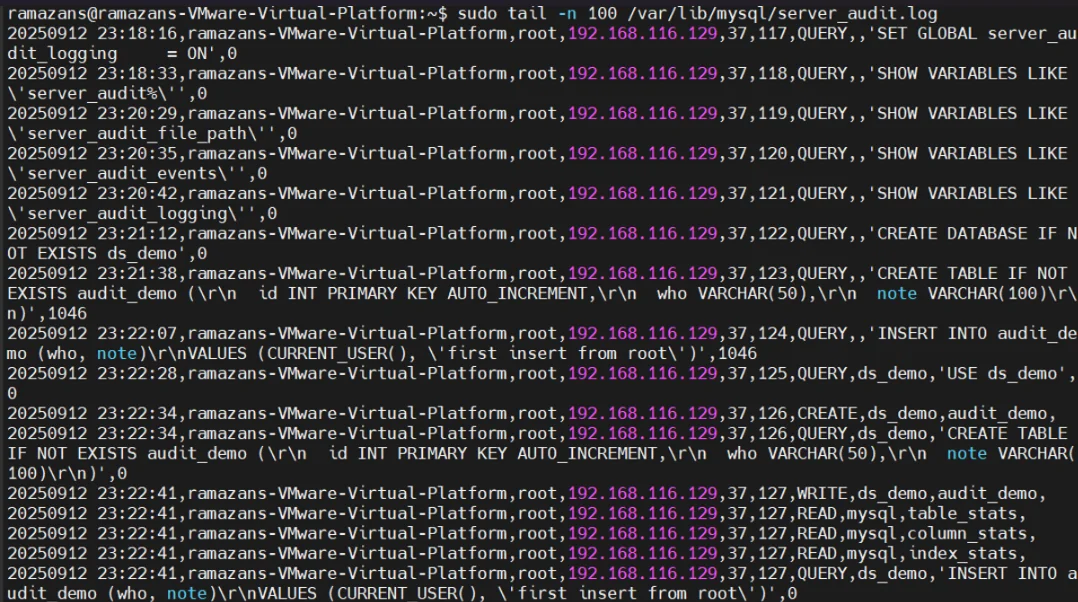
Access Control and Roles
MariaDB implements a role-based access control (RBAC) system, which simplifies the assignment and management of privileges. Instead of manually granting permissions to each user, administrators can create roles that group specific rights together. This structure makes it easier to enforce the principle of least privilege, ensuring employees only access the data they need. Roles can be updated dynamically, allowing organizations to respond quickly to staffing changes or new compliance requirements.
-- Create a role for analysts
CREATE ROLE analyst;
-- Grant limited access
GRANT SELECT ON sales_db.* TO analyst;
-- Assign role to a user
GRANT analyst TO 'user1'@'localhost';
This approach helps enforce least privilege, ensuring users only access data relevant to their function.
Encryption and Security Settings
Encryption is a core requirement of modern data governance, protecting sensitive information both at rest and in transit. MariaDB supports storage-level encryption, ensuring that even if physical files are accessed, the data remains unreadable without the correct keys. Additionally, TLS-based encryption secures communication between clients and the database, preventing interception of credentials or queries. Combined with secure key management practices, these settings help organizations comply with industry regulations such as PCI DSS and HIPAA.
-- Enable InnoDB encryption
SET GLOBAL innodb_encrypt_tables = ON;
-- Require TLS for client connections
[mysqld]
ssl_cert=/etc/mysql/server-cert.pem
ssl_key=/etc/mysql/server-key.pem
Encryption adds an essential layer of governance by securing sensitive data.
Advanced Data Governance with DataSunrise
Native MariaDB features provide a foundation, but enterprises require centralized, automated governance across multiple databases. DataSunrise enhances MariaDB with:
Sensitive Data Discovery
DataSunrise scans MariaDB databases automatically to locate sensitive data such as PII, PHI, and payment card details. Its engine goes beyond simple keyword search by applying pattern recognition, contextual analysis, and even OCR for unstructured documents. This ensures that hidden datasets are identified and secured before compliance gaps occur. Learn more in the section on Sensitive Data Discovery.
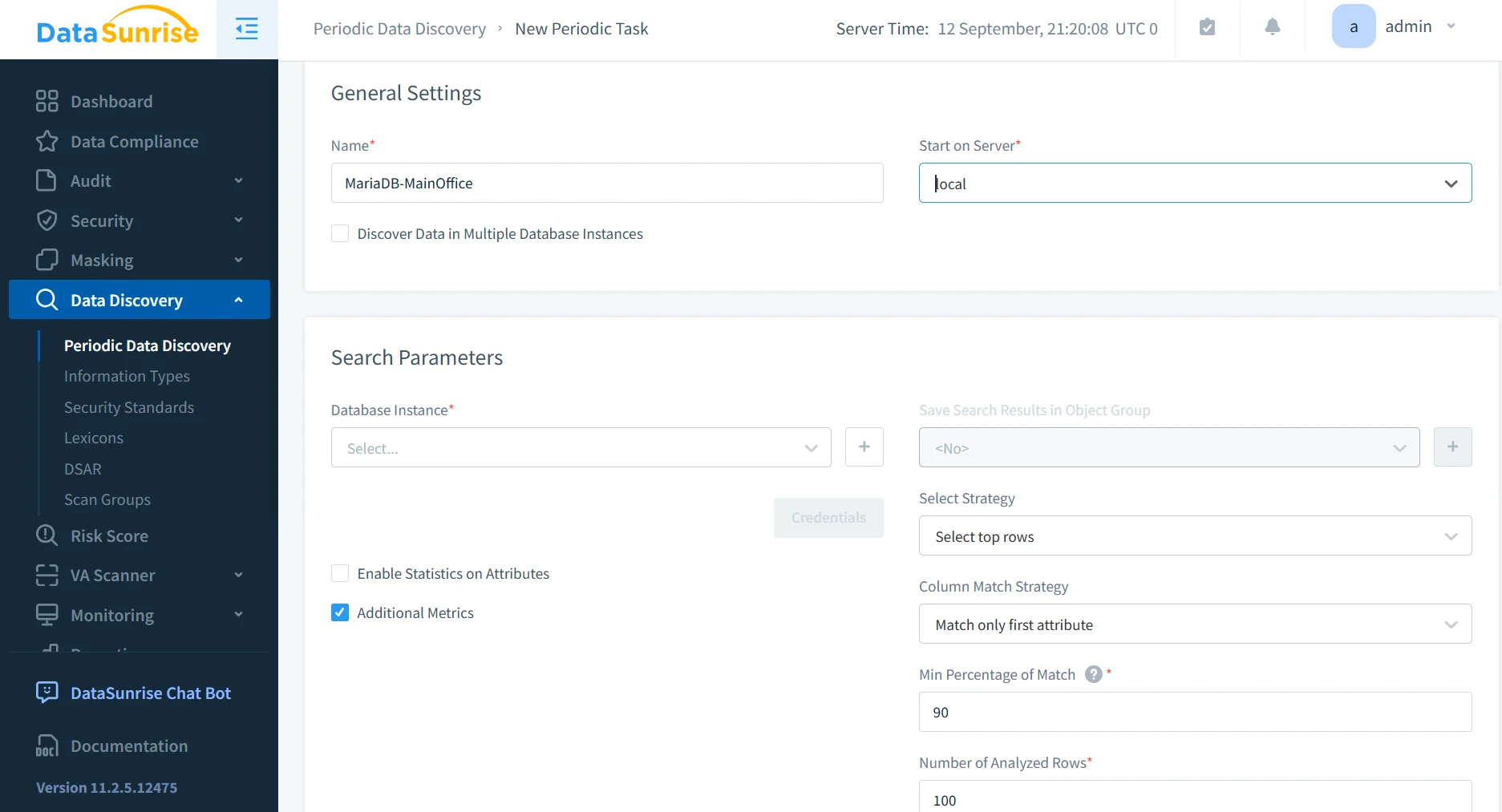
Dynamic & Static Data Masking
With DataSunrise, administrators can implement both dynamic masking, which hides sensitive values in real-time queries, and static masking, which anonymizes data in copies used for testing or analytics. This dual approach protects confidential information while preserving usability. For detailed examples, see Data Masking.
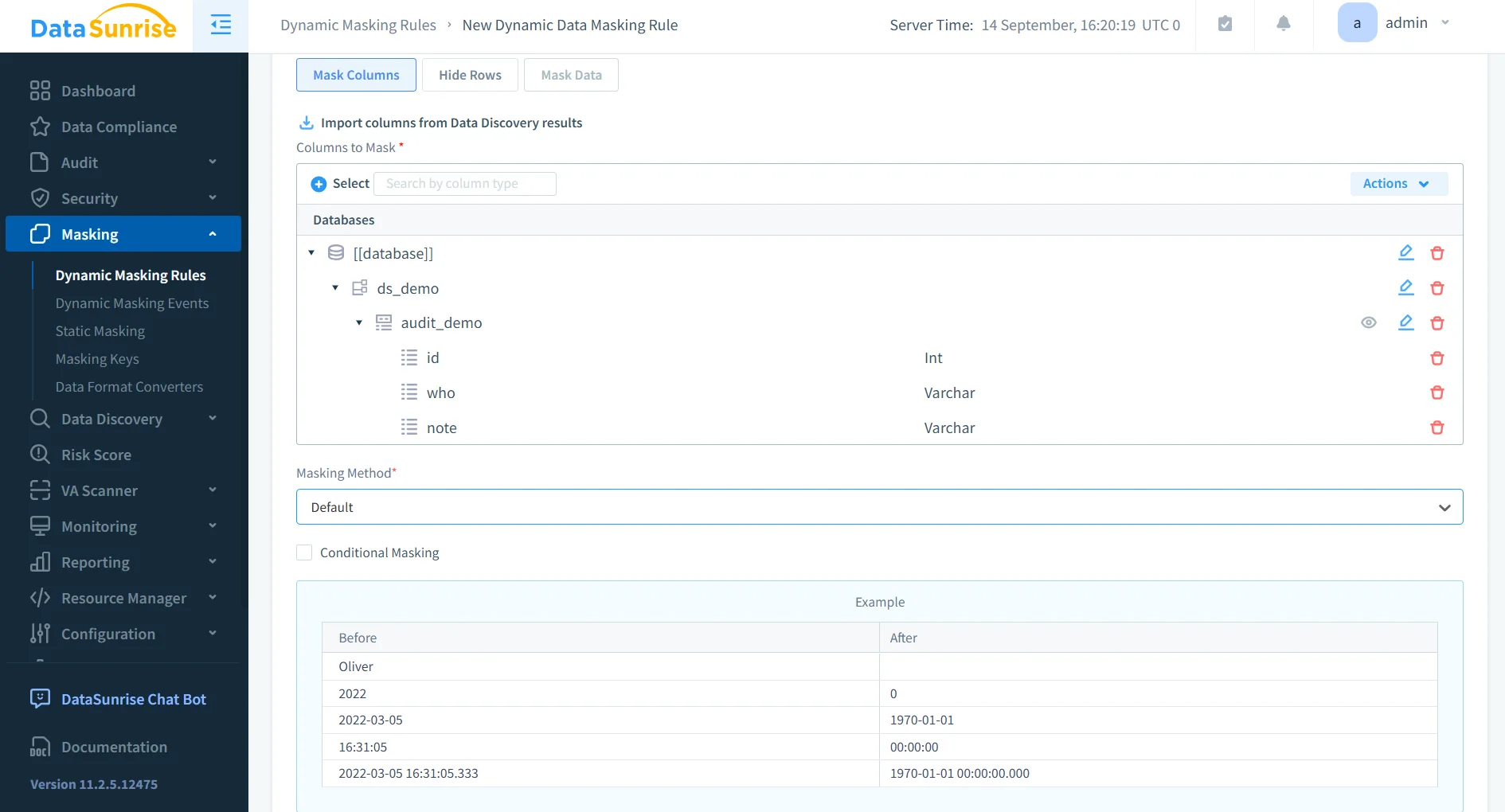
Real-Time Alerts
DataSunrise delivers immediate notifications when suspicious behavior occurs, such as unusual query patterns, failed login attempts, or mass data exports. Alerts can be integrated with SIEM tools, making them actionable within enterprise-wide security workflows. More details are available in Database Security.
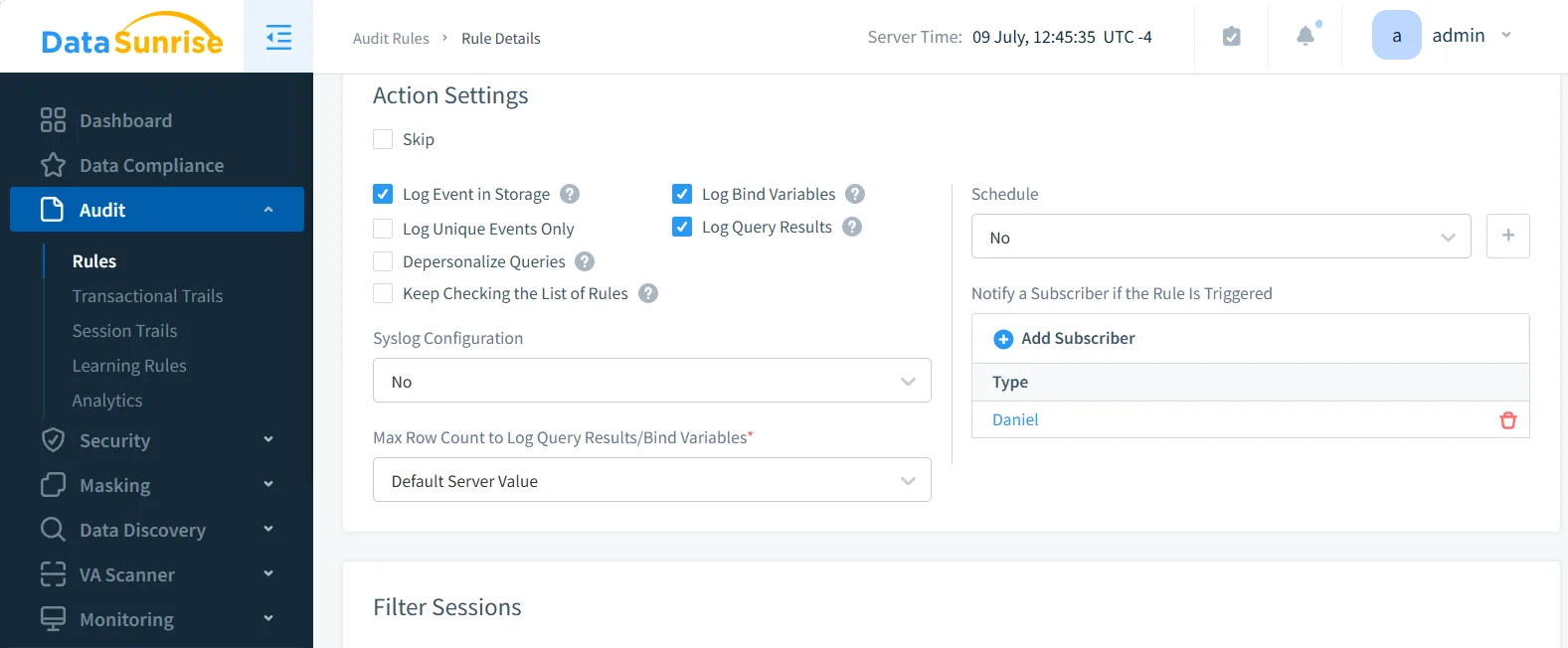
Compliance Autopilot
The Compliance Autopilot eliminates repetitive manual adjustments by automatically aligning MariaDB rules with evolving frameworks such as GDPR, HIPAA, PCI DSS, and SOX. Whenever new users or objects are added, the system applies the necessary policies. It also detects compliance drift and corrects it in real time. Explore more in Compliance Automation.
- Automatically enforces compliance rules during user and schema changes
- Continuously monitors configurations to prevent drift
- Reduces manual workload for database administrators
- Provides audit-ready documentation for regulatory reviews
Centralized Monitoring
Instead of monitoring each MariaDB instance separately, DataSunrise provides a unified governance console. Administrators can track queries, manage alerts, and enforce policies across MariaDB and 40+ supported platforms from a single dashboard. This simplifies multi-database governance and improves visibility. Learn more in Database Activity Monitoring.
- Consolidates logs and activity streams from all MariaDB instances
- Supports cross-database correlation for detecting anomalies
- Offers customizable dashboards for compliance and security teams
- Integrates with SIEM tools to extend enterprise-wide visibility
These capabilities extend beyond native logging, enabling a holistic governance strategy.
Business Impact of Data Governance for MariaDB
| Benefit | Impact |
|---|---|
| Reduced audit preparation time | Pre-built compliance reports simplify inspections |
| Lower risk of data breaches | Real-time monitoring and masking reduce exposure |
| Continuous compliance | Automated policy alignment prevents drift |
| Improved operational efficiency | Centralized management across environments |
| Cost savings | Avoidance of regulatory fines and penalties |
| Stronger customer trust | Demonstrates commitment to safeguarding sensitive information |
| Scalability for growth | Compliance processes adapt as databases and regulations evolve |
Conclusion
Applying data governance in MariaDB requires both native database features and centralized governance platforms. While roles, auditing, and encryption provide a strong baseline, solutions like DataSunrise extend visibility, enforce masking, and automate compliance across diverse environments.
Beyond meeting regulatory requirements, effective governance also supports long-term business agility. As organizations grow, governance ensures that compliance policies adapt to new regulations, evolving data volumes, and multi-cloud environments. With proactive monitoring and automation, MariaDB environments remain secure, compliant, and ready for future challenges.
Protect Your Data with DataSunrise
Secure your data across every layer with DataSunrise. Detect threats in real time with Activity Monitoring, Data Masking, and Database Firewall. Enforce Data Compliance, discover sensitive data, and protect workloads across 50+ supported cloud, on-prem, and AI system data source integrations.
Start protecting your critical data today
